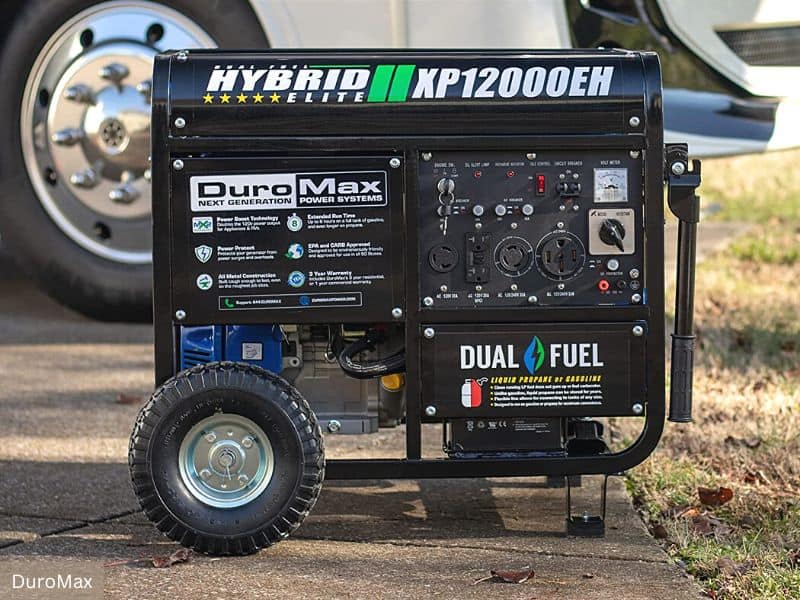Being self-reliant and self-sufficient is one of the best things about traveling in an RV.
As it allows you to explore and enjoy the outdoors without worrying about what amenities are nearby.
However, if you truly want to be self-reliant and self-sufficient while traveling and camping in an RV, it’s important to have a reliable source of portable power, for those times when you’re not able to connect to shore power.
Because of this, a reliable generator is an essential part of any RV setup, as it provides a backup source of electricity.
But with so many generator sizes and options on the market, it can be challenging as well as confusing when trying to choose the best generator for your RVing needs.
So to help provide some clarity, in this blog post, we delve into the main factors to consider when choosing a generator for a 50 Amp RV, including size, power output, noise level, run time, and fuel source.
Plus, we also answer some of the most common questions about 50-amp generators and highlight three of the most popular portable 50 Amp RV generators on the market today.
What Size Generator Do You Need for a 50 Amp RV?
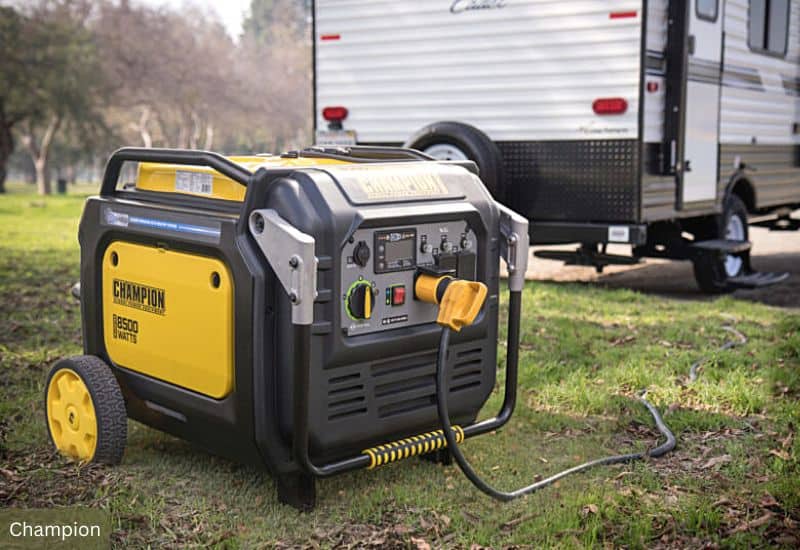
When choosing a generator for a 50 Amp RV one of the most important factors to consider is the size or more accurately the power output of the generator.
As 50 Amp RVs require a substantial amount of power and wattage to be able to run all their various appliances and electrical devices, such as ACs, furnaces, power jacks, refrigerators, microwaves, fireplaces, TVs, etc…
So it’s important to select a generator that’s capable of producing enough wattage to meet those demands.
But just how much power output or wattage does a generator need to produce to power a 50 Amp RV?
Most 50 Amp RVs need a generator that produces at least 6,000 rated or running watts of power to fully power the RV.
However, the largest of 50 Amp RVs, which have multiple AC units and large electrical systems, might need as much as 10,000 or 12,000 rated watts of power to fully power the RV.
To understand the different types of wattage a generator can produce and how this affects RV power, check out the next section.
Peak Watts Vs Rated or Running Watts
Every generator has a rating for its peak wattage and running wattage.
Peak wattage is what a generator can produce in short bursts to power certain electrical devices, such as air conditioners and refrigerators, which require a large initial power surge to start up.
Whereas rated or running wattage is what a generator can produce over an extended period of time, which is what’s needed to run the various electrical devices in your RV on a continuous basis.
And while both wattage types are important, a generator’s rated or running wattage is the one that really matters when picking out a generator and the one that needs to be at least 6,000 watts.
As this is the minimal amount of wattage a generator needs to produce on a continuous basis to be able to adequately power a 50 Amp RV.
Other Factors to Consider When Buying a 50 Amp RV Generator
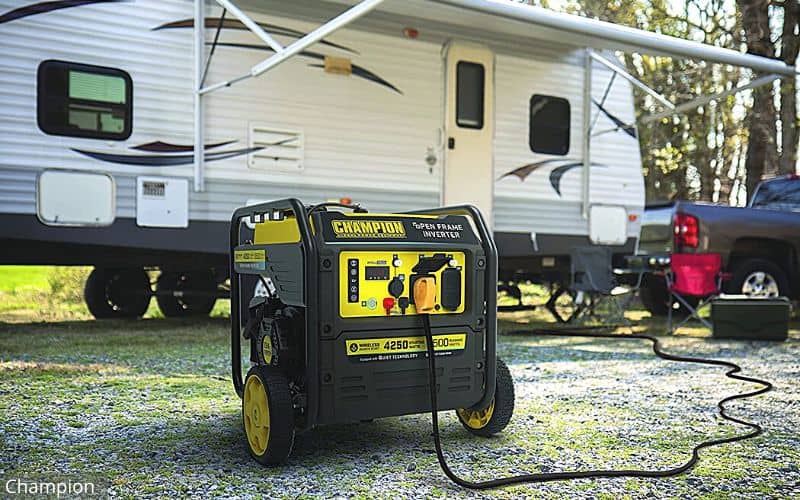
While power output is one of the most important factors to consider when choosing a generator for a 50 Amp RV, it’s not the only factor you need to consider.
As there are other important factors that need to be taken into account when buying a 50-amp generator, such as cost, noise level, run time, and more.
To help ensure that the generator you choose is best suited for your specific RVing needs,
So let’s take a closer look at each of these additional factors that need to be taken into account when buying a 50 Amp RV generator.
Cost
After power output, often the next most considered factor when choosing a generator is its cost.
As the cost of a 50 Amp generator can vary significantly depending on its brand, model, and features.
For example, basic models can cost as little as $750, while more advanced and high-end models with higher power outputs, quieter operation, and longer run times can cost more than $2,000.
So when choosing a 50 Amp generator, it’s important to first figure out what your budget is and then determine what features are most important to you.
As this will allow you to maximize your available generator budget.
Noise Level
After evaluating cost, one of the next most important factors to consider when choosing an RV generator is its noise level.
As generators, especially large 50-amp versions, can produce a significant amount of noise, often ranging between 60 and 80 decibels.
(For comparison, an average gas-powered push lawn mower usually produces between 90 and 95 decibels.)
Because of this, most campgrounds and RV parks have quiet hours, often spanning from 10 pm to 6 am, which prohibits the use of a generator.
To make the camping experience more enjoyable for everyone.
As no one goes camping or into nature to hear a 500cc motor/generator running day and night.
So when choosing an RV generator you should look for the quietest one you can find that still fits within your budget.
As this will not only provide a better camping experience and allow you to enjoy the sounds of nature better but it will also allow you to be a better camp neighbor if you happen to be using the generator in a campground or RV park.
Run Time
The next factor to consider when choosing a 50 Amp RV generator is its run time, which is the amount of time it can continuously produce power before running out of fuel.
Typically, the run time for a portable 50 Amp generator ranges from 6-12 hours, depending on the size of its fuel tank and its fuel efficiency.
However, it’s important to keep in mind that the load being placed on the generator will impact its run time.
For example, a generator that has a run time of 12 hours under a 50% load, might only have a run time of 8 hours or less, under a 75% load.
Which is another reason why the generator’s power output is important.
As larger generators with higher power outputs will have to work much less hard to produce the same amount of power compared to smaller less powerful generators.
Potentially leading to longer run times with larger generators.
Regardless of what size or power output you go with though, when looking for a 50 Amp RV generator, you should look for one that offers at least an 8-hour run time.
As this will provide plenty of utility and power flexibility while camping and boondocking.
Fuel Source
Different 50 Amp RV generators can use a variety of fuel sources, including gasoline, propane, and even natural gas on select models.
However, by far, the two most prevalent fuel sources for 50-amp generators are gasoline and propane.
As they both offer excellent energy density and provide a reliable source of fuel for off-grid electricity production.
There are a few differences between these two main fuel sources though that you should be aware of, which we’ve outlined below.
Gasoline
For instance, gasoline is generally considered to be the most affordable and convenient fuel source.
As it’s widely available at gas stations, while also being relatively easy to store and transport, thanks to its liquid form.
On top of that, opting for gasoline as fuel allows the generator to produce the greatest wattage and energy output.
As generators running on gasoline tend to produce roughly 10 percent more peak watts and running watts compared to generators running on propane.
Propane
However, there are some advantages to using propane as a generator fuel source as well.
Because while propane is typically more expensive than gasoline, it generally provides better fuel efficiency, due to its higher energy density, leading to longer run times.
In addition, propane is also able to store for longer periods of time without degrading, making it ideal for long-term storage and travel.
Dual Fuel Generator
Due to the various benefits of both gasoline and propane as a generator fuel source, one of the best options when trying to choose between the two, is to not have to choose at all.
Which is possible, thanks to dual-fuel generators.
As dual-fuel generators allow you to run the generator off either gas or propane, providing the best of both worlds.
Making dual-fuel functionality one of the most desirable features available on a 50-amp generator.
Ports & Outlets
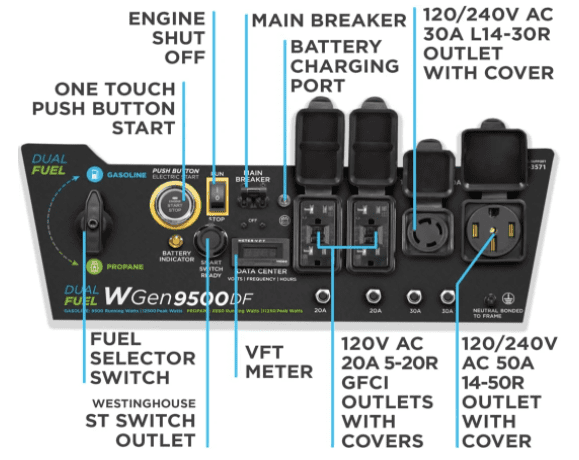
Another important factor to consider when selecting a 50 Amp generator for an RV is what kind of ports and outlets it has.
As this will ultimately determine what type of plugs you’re able to plug in and what types of power you’re able to generate.
For example, most 50 Amp generators will include a minimum of two 120V 15/20 Amp outlets, as well as a 120V 30 Amp outlet, and a 240V 50 Amp outlet.
In addition, some models will also offer additional outlets, such as USB ports for charging devices as well as a 12V DC outlet.
Don’t just assume that these outlets exist on the generator you’re looking at though, as power outlets can vary from one generator to the next.
Because of this, it’s important to take note of what outlets a generator has, as this will dictate what you can and cannot power with the generator.
Portability & Weight
Due to the large size of 50-amp generators, there really is no such thing as a light 50-amp generator.
As most 50 Amp generators usually weigh somewhere around 200 pounds, with some weighing slightly less and some weighing slightly more, depending on the overall size of the engine and how well it’s built.
However,when shopping for a 50 Amp RV generator you can look for portability features, such as wheels and folding handles.
As these make it much easier to move the generator from one location to another or around the campsite without having to lift or carry the entire unit.
So if you’re looking for a 50-amp generator that you can easily move around, it’s important to look for these features.
Features & Upgrades
Finally, it’s also important to consider what features and upgrades the 50-amp generator offers.
As individual features and upgrades are often what sets one generator apart from another.
And while there is no one set of features or upgrades you should look for when choosing a generator, as this will depend on what’s important to you and how you plan to use the generator.
We’ve compiled the below list of some of the most popular generator features and upgrades below.
Popular Generator Features and Upgrades
- Dual Fuel Operation
- Electric Start
- Remote Start
- Heavy-Duty Wheel Kit
- LCD Displays
- Parallel Capability
- Fuel Gauge Indicator
- Carbon Monoxide Detector with Automatic Shut Off
- Low-Oil Shutdown
- Weatherproofing
- Large Flip-Up Extended Handles
Three Top Selling 50 Amp RV Generators (Least to Most Expensive)
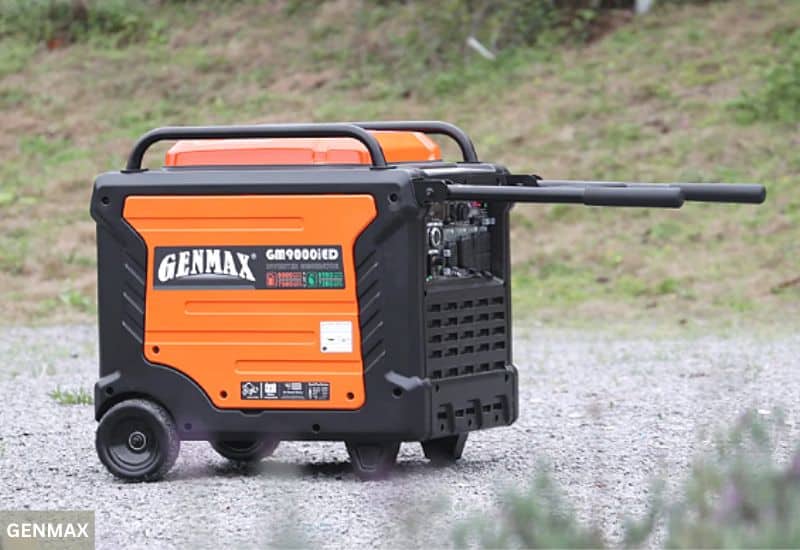
Now that you know what size generator you need for a 50 Amp RV, and what features and specifications to look for, here are three of the top-selling 50 Amp generators currently on the market.
Champion Power Equipment 201004 Portable Generator
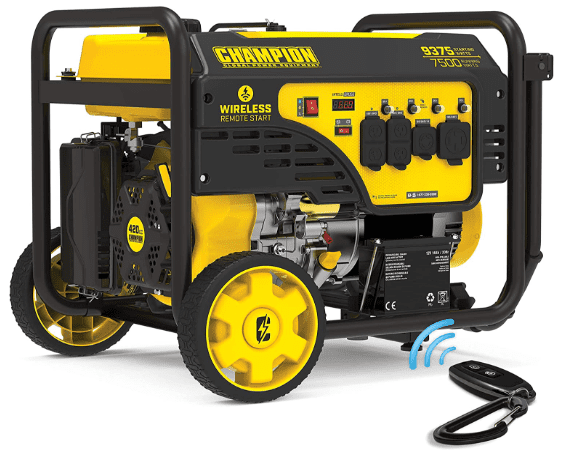
Quick Specs
- Price: $775
- Peak/Rated Watts: 9375W/7500W
- Fuel Type: Gas
- Outlets: 120V GFCI 20A, 120/240V 30A, 120/240V 50A
- Noise Level: 74 dBA
- Run Time: 8 Hours (at 50% Load)
- Weight: 206.1 lbs
Westinghouse WGen9500DF Dual Fuel Portable Generator
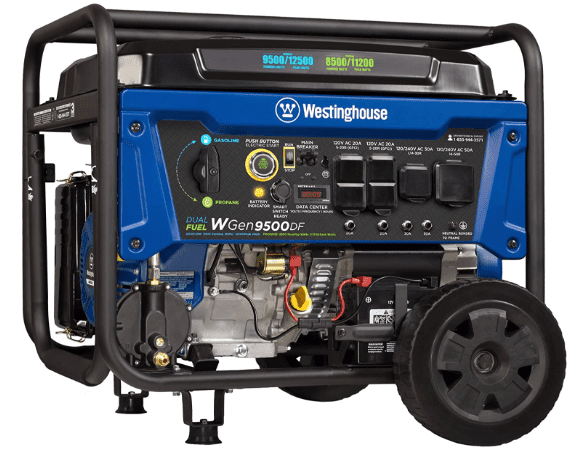
Quick Specs
- Price: $1,000
- Peak/Rated Watts: 12500W/9500W (Gasoline)
- Fuel Type: Gas/Propane
- Outlets: 120V 20A, 120/240V 30A, 120/240V 50A
- Noise Level: 74 dBA
- Run Time: Up to 12 Hours
- Weight: 199.6 lbs
GENMAX GM9000iED Portable Inverter Generator
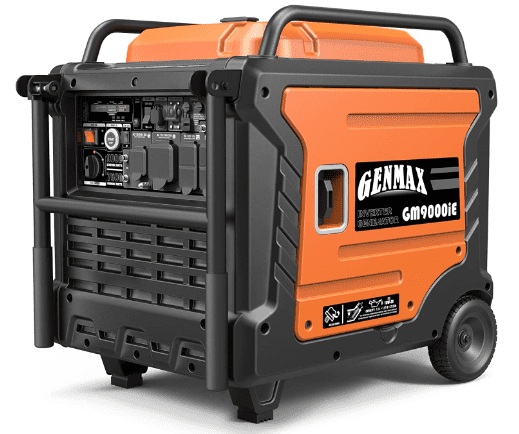
Quick Specs
- Price: $2,200
- Peak/Rated Watts: 9000W/7600W
- Fuel Type: Gas
- Outlets: 5V 1A/2.1A DC USB, 120V GFCI 20A, 120/240V 30A, 120/240V 50A
- Noise Level: 62 dBA
- Run Time: 10 Hours (at 50% Load)
- Weight: 259 lbs
To see other popular and highly rated 50 Amp generators, be sure to check out our blog post “8 Best 50 Amp RV Generators for 2023 (Ranked & Reviewed)“.
What’s the Difference Between a 30 Amp and a 50 Amp Generator?
The main difference between a 30 Amp and 50 Amp generator, beyond its amperage, is the amount of electricity or wattage they can provide.
Because while a 30 Amp generator will usually produce around 4,500 peak watts and 3,500 rated watts, a 50 Amp generator will usually produce around 9,000 peak watts and 8,000 rated watts, and as much as 12,000 peak watts and 10,000 rated watts.
Allowing a 50-amp generator to provide much more power to appliances and devices at the same time, making it more suitable for larger more feature-rich RVs.
Beyond amperage and wattage though, another difference between 30 Amp and 50 Amp generators is their available outlets.
Because while a 30-amp generator will have a NEMA TT-30R outlet, designed for a three-pronged NEMA TT-30P plug, a 50-amp generator will have a NEMA 14-50R outlet, designed for a four-pronged NEMA 14-50P plug.
It’s worth noting though, that both 30 Amp and 50 Amp generators will have more outlets than just these.
In fact, most 50 Amp generators will actually have a NEMA TT-30R outlet as well as a NEMA 14-50R outlet, allowing you to provide power to either a 30 Amp or a 50 Amp RV.
For more information on 30 Amp RVs and generators, check out our blog post “What Size Generator Do You Need for a 30 Amp RV?“.
Can You Run a 50 Amp RV on a 30 Amp Generator?
While it’s always best to use a generator that’s properly sized for the RV’s electrical needs, it is technically possible to use a 30 Amp generator to partially power a 50 Amp RV, in a pinch.
If you choose to go this route though, there are a few things to keep in mind.
The first is that while it is possible to partially power a 50 Amp RV with a 30 Amp generator, it will never be able to fully power a 50 Amp RV.
Due to the more limited power output of a 30 Amp generator.
So while you could potentially power the RV’s lighting, a few outlets, and perhaps one or two main components, anything more than this, and you’re going to trip the breaker and potentially damage the generator and or the RV.
Secondly, RVs with 50 Amp service are not designed for a three-pronged 30 Amp plug (NEMA TT-30P), as they instead use a four-pronged 50 Amp plug (NEMA 14-50P).
Because of this, if you plan to use a 30 Amp generator to power a 50 Amp RV, you’ll need a dogbone electrical adapter that has a 30A male to 50A female, to go between the 30 Amp generator and the 50 Amp power cord used to power a 50 Amp RV.
And the last thing to keep in mind if you choose to partially power a 50 Amp RV with a 30 Amp generator is to keep it brief and exercise caution and common sense.
Because as stated above, the best practice is to always use a generator that’s properly sized for the RV’s electrical needs.
As this will greatly reduce the likelihood of overheating, fire, and or damage to the generator and or the RV.
Can You Use a Portable Generator or Do You Need a Permanent Model for a 50-Amp RV?
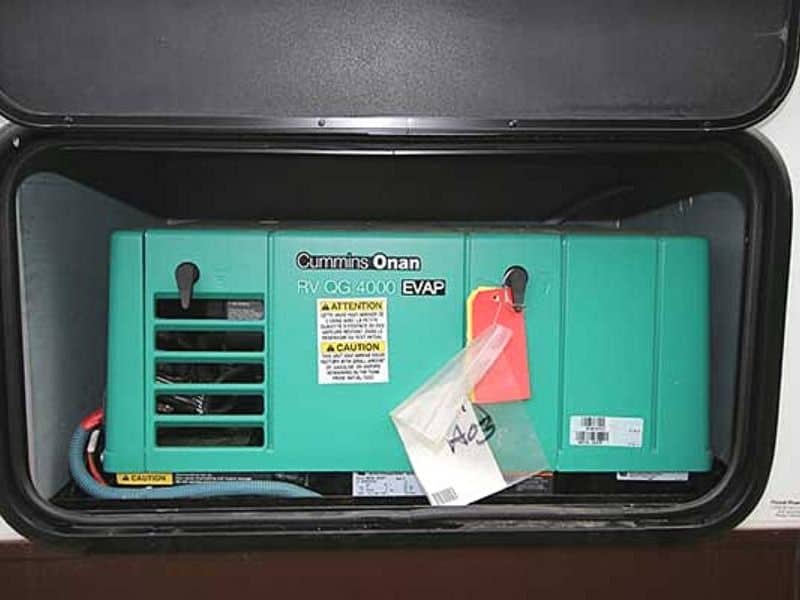
This blog post is largely about portable generators and what size you need for a 50-amp RV.
However, you might be wondering about the differences between portable and permanently installed RV generators and which one you should go with.
The answer to this question though is typically already answered for you depending on which type of RV you have.
As most drivable RVs, such as Class A, B, and C RVs already have permanently installed models put in by the RV manufacturer, while towable RVs, such as travel trailers, teardrop campers, pop-ups, and 5th wheels typically do not.
Because of this, if you own a drivable RV, you should just use the permanent model already installed on the RV, as it will be the most reliable option and already sized correctly for the RVs power requirements.
If on the other hand, you own a towable RV, you will need to purchase a portable generator to provide off-grid power to the RV, when you can’t connect to shore power.
As installing a permanent generator after the fact into a towable RV is often cost-prohibitive.
Portable Generators Vs Permanent RV Generators
Portable generators are smaller, more portable, and generally more affordable than permanent generators.
They are easy to move around the campsite and can be used to power a variety of different devices, as they often have multiple outlets available beyond just the one needed to power the RV.
However, they are generally not as powerful as permanent generators and may not be able to handle the high electrical demands of extremely large and power-hungry RVs.
In addition, they also require regular refueling and may be less reliable than permanent generators.
Permanent generators, on the other hand, are larger and more powerful and are designed to provide a continuous supply of electricity for longer periods of time.
They are typically installed in one of the exterior storage bays on the RV and are connected directly to the RV’s electrical system.
They are more expensive than portable generators, but they are also more reliable and can handle the high electrical demands of extremely large power-hungry RVs.
Will a 7500-Watt Generator Run a 50-amp RV?
A 7500-rated watt generator should be able to power most 50-amp RVs, provided that the generator is capable of providing the necessary amount of power required by the RV.
As different 50 Amp RVs can have different power requirements, depending on the specific appliances and features inside the RV and its overall size.
For example, larger 50 Amp RVs with multiple AC units will require more power or wattage from a generator than a smaller 50 Amp RV with only one AC unit.
Generally speaking though, as stated at the beginning of this blog post, most 50 Amp RVs should be able to run on 6,000 rated watts of power, which means that a 7,500 rated watt generator should provide more than enough power for any average-sized 50 Amp RV.
Will a Predator 3500 Run a 50 Amp Camper?
The Harbor Freight Predator 3500 generator will not fully run or power a 50 Amp camper.
As the generator is only a 30 Amp generator offering only 3,500 peak watts and 3,000 rated watts of power, neither of which is enough to adequately power a 50 Amp camper.
In addition, like other 30 Amp generators, the Predator 3500 only produces 120 volts instead of the needed 240 volts required to properly power a 50 Amp RV and lacks the needed 50A NEMA 14-50R outlet, only offering a 30A NEMA TT-30R outlet.
How Many Amps Will a 9,000-Watt Generator Run?
While available amps can vary from one generator to the next, depending on its size and power output, a generator capable of producing 9,000 watts of power will typically be a 50 Amp generator.
Final Thoughts
Choosing what size generator you need to power a 50 Amp RV can be somewhat overwhelming and even confusing if you lack a basic understanding of electricity and how that relates to RV power.
So in this article, we provided basic foundational knowledge about electricity and RV power, to help you make a more informed decision about what size generator you need to power a 50 Amp RV.
Plus, we also built on that knowledge by highlighting some of the other key factors to look for when choosing an RV generator.
And then finally rounded out the blog post by answering some common questions about RV generators and RV power.
So hopefully now, armed with all the above information, you’re able to pick out the best generator for your own unique situation and RV power needs.
Recent Posts
When cruising down the highway in your RV, the last thing you want is a tire blowout! Not only is it dangerous, but RV tire replacement isn't cheap, costing $200 to $300 per tire. The good news,...
Nothing ruins an RV adventure faster than a breakdown with no way to fix it. Because of this, every RVer should have a well-stocked RV tool kit for those unexpected roadside emergencies and campsite...

